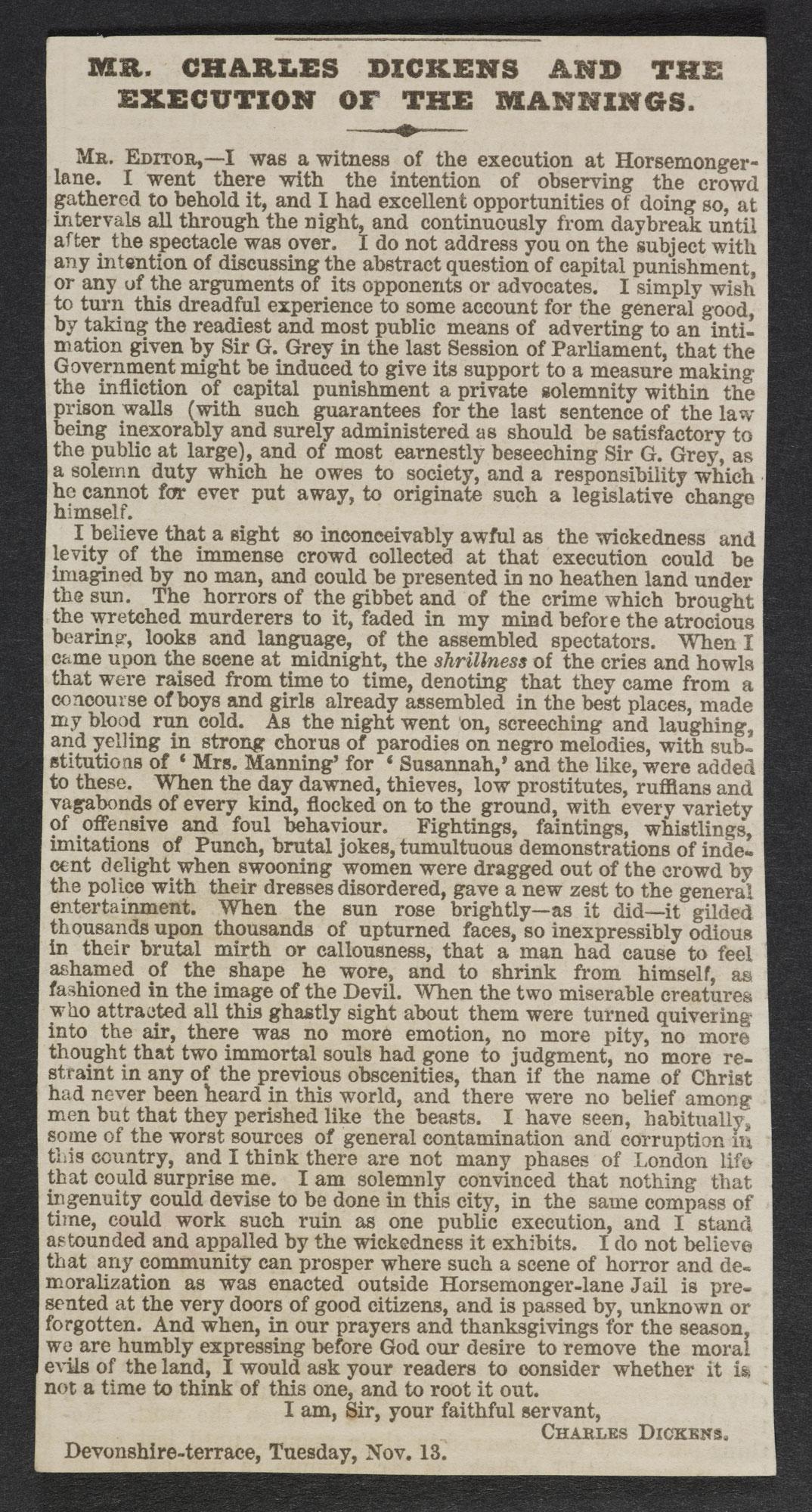Mr. Editor,
I was a witness of the execution at Horsemonger Lane this morning. I went there with the intention of observing the crowd gathered to behold it, and I had excellent opportunities of doing so, at intervals all through the night, and continuously from daybreak until after the spectacle was over. I do not address you on the subject with any intention of discussing the abstract question of capital punishment, or any of the arguments of its opponents or advocates. I simply wish to turn this dreadful experience to some account for the general good, by taking the readiest and most public means of adverting to an intimation given by Sir G. Grey in the last session of Parliament, that the Government might be induced to give its support to a measure making the infliction of capital punishment a private solemnity within the prison walls (with such guarantees for the last sentence of the law being inexorably and surely administered as should be satisfactory to the public at large), and of most earnestly beseeching Sir G. Grey, as a solemn duty which he owes to society, and a responsibility which he cannot for ever put away, to originate such a legislative change himself. I believe that a sight so inconceivably awful as the wickedness and levity of the immense crowd collected at that execution this morning could be imagined by no man, and could be presented in no heathen land under the sun. The horrors of the gibbet and of the crime which brought the wretched murderers to it faded in my mind before the atrocious bearing, looks, and language of the assembled spectators. When I came upon the scene at midnight, the shrillness of the cries and howls that were raised from time to time, denoting that they came from a concourse of boys and girls already assembled in the best places, made my blood run cold. As the night went on, screeching, and laughing, and yelling in strong chorus of parodies on negro melodies, with substitutions of “Mrs. Manning” for “Susannah” and the like, were added to these. When the day dawned, thieves, low prostitutes, ruffians, and vagabonds of every kind, flocked on to the ground, with every variety of offensive and foul behaviour. Fightings, faintings, whistlings, imitations of Punch, brutal jokes, tumultuous demonstrations of indecent delight when swooning women were dragged out of the crowd by the police, with their dresses disordered, gave a new zest to the general entertainment. When the sun rose brightly— as it did— it gilded thousands upon thousands of upturned faces, so inexpressibly odious in their brutal mirth or callousness, that a man had cause to feel ashamed of the shape he wore, and to shrink from himself, as fashioned in the image of the Devil. When the two miserable creatures who attracted all this ghastly sight about them were turned quivering into the air, there was no more emotion, no more pity, no more thought that two immortal souls had gone to judgement, no more restraint in any of the previous obscenities, than if the name of Christ had never been heard in this world, and there were no belief among men but that they perished like the beasts.I have seen, habitually, some of the worst sources of general contamination and corruption in this country, and I think there are not many phases of London life that could surprise me. I am solemnly convinced that nothing that ingenuity could devise to be done in this city, in the same compass of time, could work such ruin as one public execution, and I stand astounded and appalled by the wickedness it exhibits. I do not believe that any community can prosper where such a scene of horror and demoralization as was enacted this morning outside Horsemonger Lane Gaol is presented at the very doors of good citizens, and is passed by, unknown or forgotten. And when in our prayers and thanksgivings for the season we are humbly expressing before God our desire to remove the moral evils of the land, I would ask your readers to consider whether it is not a time to think of this one, and to root it out.
I am, Sir, your faithful Servant.
Charles Dickens
Copyright
©Britishlibrary
Vetted?
No


